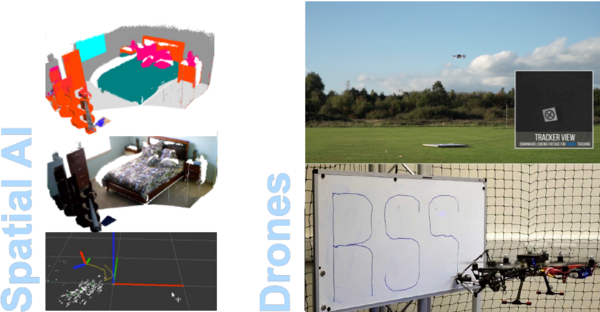Smart Robotics Lab
The Smart Robotics Lab (SRL) focuses on enabling technologies for mobile robots operating in a potentially unknown environment. This includes localisation (without infrastructure such as GPS), mapping, and 3D scene understanding with a suite of sensors, most importantly cameras. Respective algorithms ranging from computer vision and machine learning to motion planning and control need to be processed efficiently on-board to yield accurate results in real-time. The aim is to empower the next generation of mobile robots that plan and execute complex tasks in potentially cluttered, and dynamic environments, possibly close to people. SRL is applying the technology to drones, as used e.g. in autonomous inspection or construction scenarios demanding proximity or physical contact with structure.
Interested in joining? Visit the Application Form!
SRL is currently considering PhD and postdoc applicants with background in SLAM and robot/drone navigation for the following projects:
- Digital Forestry (EU Project)
- Spatial AI for Cooperative Construction Robotics
- Multimodal Perception
Please mention your interest in any of these in your application.
Current Main Research Interests
As detailed in the Research Areas tab, the main areas of interest are the following:
- Multi-Sensor SLAM: fusion of vision with IMU, GPS, wheel odometry, etc.
- (Dense) Map Representations: building scalable and high-quality maps supporting complex robotics tasks.
- Semantic, Object-level and Dynamic SLAM: understanding the 3D world in a meaningful way to support complex robotic tasks and natural interaction with robot operators.
- Machine Learning: methods, often based on Deep Learning, to learn various aspects of SLAM, navigation and control.
- Robot Navigation: leveraging the above SLAM techniques to support planning and execution of save actions.
- Physical Environment Interaction: e.g. pick-and-place of objects or drones painting and drilling.
- Drones: as test and demonstration platform to showcase the above capabilities, from SLAM to control, navigation, and manipulation.



